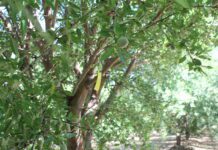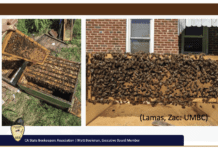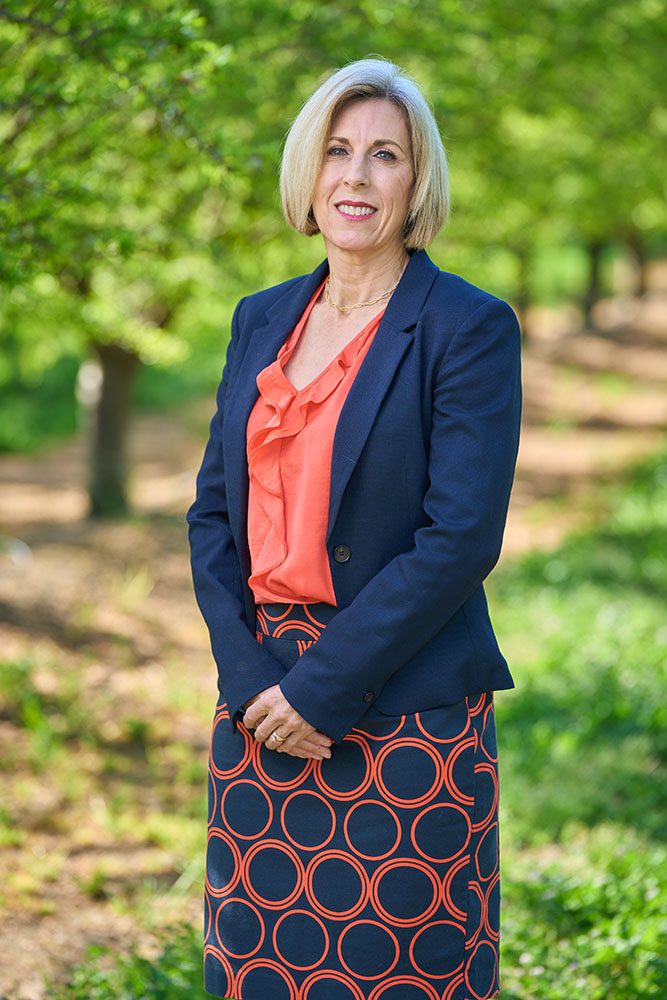
The Almond Board of California’s new chair, Alicia Rockwell, is ready to take on a new role with innovation, partnerships and storytelling. Rockwell, who was vice chair before taking over as chair in January, continues to focus on the Almond Board’s strategic initiatives and to collaborate with the board and new vice chair Brandon Rebiero, a co-founder of Gold Leaf Farming. Rockwell is optimistic about the future of the industry, pointing to the strong global demand. In addition, Rockwell highlights the success of ongoing work including spreading the word about the nutritional benefits of almonds, expanding markets and the industry’s data-driven stewardship, aided by the California Almond Stewardship Platform (CASP), the self-assessment tool for growers.
“We’re basically zero waste in our production practices and we have very good efficiencies with our use of water; we get four crops for every drop of water,” Rockwell said. New innovations to increase production efficiencies were showcased at The Almond Conference 2024. ABC uses artificial intelligence and big data to pinpoint more opportunities to grow the industry. In China, ABC worked with Tmall, the biggest online retailer in the world, to identify popular almond trends.
In 2025, ABC will continue to build culinary connections and explore collaboration and educational partnerships with the Culinary Institute of America and others in recipe development..
“I think there is so much opportunity to work with chefs around the world to get them excited about all the different ways they can use almonds in the recipes they develop and the menus they create,” Rockwell said. Success is further fueled by almond advocates, such as ABC’s latest spokesperson, “Coach Prime” Deion Sanders.
Rockwell, a native Californian from the Bay Area, found a deep respect for almond growers and their families after settling in the Central Valley post-college. Besides her role as board chair, she is the chief government and public affairs officer at Blue Diamond Growers. We recently caught up with Rockwell as she shared her insight on the state of the industry at present and looking ahead.
Q. Does farming or food run in your family?
When I attended school at Chico State, I became more familiar with the Central Valley and even almond production. I was a competitive runner at Chico, and at times we would do training runs around the almond orchards. After college, I settled in the Central Valley and raised my family in Escalon. That’s where I became engaged directly with almond farming families. I raised my children alongside them, a lot of the families were close friends, and I got to understand what it means to be a generational farm family. I have great respect for what it takes to farm, to provide for their family and to the community. They do many things to support our local communities, and I always appreciated that.
The next part of my career also increased my knowledge and appreciation for food and food production. I spent 17 years working for a private independent grocer, Save Mart, where I handled communications and public affairs. That meant I needed to be fully educated on consumer issues because often consumers are concerned about where their product is coming from and how it is produced and grown. I would go out on farm and field tours and learn more about those practices. It was very helpful in preparing me for my next career phase which was coming to Blue Diamond 10 years ago.
Q. What are the biggest challenges the almond industry faces and what’s your crystal ball on where it’s headed?
Here’s the forever plus for our industry: The world wants California almonds, so our demand is strong, and it is consistent. We are extremely resilient, and we know how to innovate and how to adapt. And the Almond Board’s ability to do research and generate demand helps us expand the growth of our industry and the sale of almonds. Yes, there will be challenges, but there have always been challenges, and we have always been resilient.
Q. What are some of your priorities as board chair this year?
Within our strategic initiatives, I am excited about building culinary connections, advancing the story about nutrition and connecting even more with Californians. I believe consumers are looking for nutritious, protein-dense, whole foods to nourish them and to help them feel good about what they’re eating, and almonds are perfect for them. I also think there’s a huge opportunity for us to continue connecting with the majority of Californians. Almonds are primarily grown in the Central Valley, so unless you drive between Highway 99 and Interstate 5, you may not even know almonds are grown on a tree. When they learn more about how almonds grow and what’s inside them, they’ll fall even more in love.
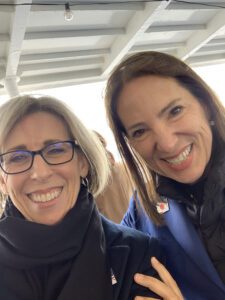
Q. Please share more about the role of partnerships.
In terms of research, we partner with many renowned universities and research institutes, including the UCs. That’s not just in California; we work with research institutes around the world. Their work expanding the knowledge about almond nutrition helps us tell the stories of how wonderful almonds are.
Q. Can you share more about food innovation?
One of the things we are most excited about is the incredible opportunities around almonds. Fortunately, our nut comes in a lot of forms, and by forms it means it could be butter, it could be a flour, it could be oil, it could be sliced and chopped and applied in a lot of different ways. And it was the No. 1 nut introduced into new products globally last year. We are building culinary connections we hope will increase the range and volume of products using almonds.
Q. This also connects with health and wellness, doesn’t it?
Yes, they absolutely go hand-in-hand; nutrition has long been the hallmark for us. The newer research is expanding on how wonderful and how healthy almonds are. When you look at all the science out there, these are the most power packed little nuts. It’s incredible. The newest research shows how almonds help people recover from exercise, and you’ve seen us talk about that with our latest spokesperson. Coach Deion Sanders has done a great job bringing that message home to a large, diverse audience, including along Radio Row at the Super Bowl.
Q. Tell Us More About the Stewardship Story?
We’ve always had a strong stewardship story to tell, and we record that with CASP, the self-assessment tool many of our growers have used. The data has built credibility around the production practices of our growers as well as supported business growth. We are basically zero waste in our production practices. We are very efficient with our use of water. We get four crops for every drop, and that is something unique about our industry. We are also helping California meet their carbon neutral goal. Research has come forth that our trees have sequestered 30 million metrics tons of carbon. A lot of that is supported by the research and data done by the Almond Board.
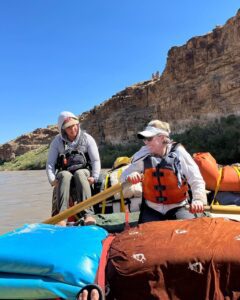
Q. How important is ag innovation to California’s almond industry?
In California, all agriculture is under some of the highest regulatory structures, which makes our food incredibly safe. I’d say the innovation that is needed to support that is incredibly important as is any innovation that can help farmers farm better.
Q. What role does innovation play as a solution when it comes to challenges with water?
We continue to be one of the most innovative around our irrigation practices. As far as on farms, we are using microirrigation and we are using drip systems. A large sector of our almond farmers have those in place, so it allows us to place the water right on the root zone, making it most efficient. That means you don’t need to give the tree more than what’s needed and at the same time; that is driving greater yield on our trees. In recent decades, California almond farmers have reduced the amount of water needed to grow a pound of almonds by 33%, with a goal of reducing it another 15%.
Q. Why accept the board position when you’re already so busy?
I am very committed and attached to all the small family farms up and down the valley. I raised my children with their children, I understand how difficult farming can be and have a great appreciation for what it takes to feed the world, which is what they’re trying to do. It is very personal to me. I don’t take that lightly, so whatever talents and skills I have, if I can help advance their ability to keep farming in California and maintain their farm for generations, I’m going to do that.

Q. How do we get more women and youth involved in the almond industry?
We have a wonderful program at the board. Our Almond Leadership Program has been so effective at bringing a variety of creative, innovative people into our industry. The creativity and the things the people who have come through that program have done has been amazing. Many of them now serve on Almond Board committees and even the Board of Directors.
Q. Outside of work, what are your passions and hobbies?
I enjoy traveling quite a bit with my family. We took a wonderful trip last summer to Italy and it included my daughter’s in-law, who had never been on an international trip. Traveling is important, but it isn’t just abroad, it’s also travelling locally within California. When I was a child, I spent a lot of time with my family backpacking and hiking California. I do love being outdoors. It brings me a great deal of joy.








